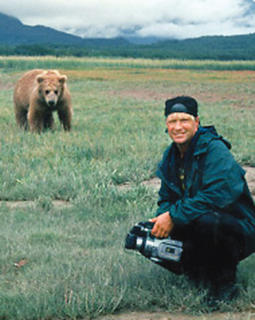Loves of a Blonde: Grizzly Man
 In two documentaries about his work, Burden of Dreams and My Best Fiend, Werner Herzog makes it clear that he fears nature and loathes its brutish power over man, while revealing his affinity for a certain talented, but tortured blonde. Grizzly Man may prove Herzog's most personal statement yet. Herzog's compassion and curiosity decidedly influence his approach to Timothy Treadwell, an ex-alcoholic and would-be actor turned amateur naturalist. In dealing with this man, his life and works, Herzog mutes his usual cynicism and takes Treadwell at face value, his skepticism abiding what might seem the behavior of a suicide.
In two documentaries about his work, Burden of Dreams and My Best Fiend, Werner Herzog makes it clear that he fears nature and loathes its brutish power over man, while revealing his affinity for a certain talented, but tortured blonde. Grizzly Man may prove Herzog's most personal statement yet. Herzog's compassion and curiosity decidedly influence his approach to Timothy Treadwell, an ex-alcoholic and would-be actor turned amateur naturalist. In dealing with this man, his life and works, Herzog mutes his usual cynicism and takes Treadwell at face value, his skepticism abiding what might seem the behavior of a suicide.We meet Treadwell in media res, at play in his fantastical world of anthropomorphic creatures, as we get to know him through footage shot by an off-camera partner, likely whichever woman he was dating at the time. Like Bruce Dern in Silent Running, Treadwell hopes to present himself in a way that makes him a Brooks' Farmer, while his Margaret Fuller is kept off-camera to preserve his facade of transcendental austerity and self-determination. Strangely, Herzog reserves judgement on this score, when it would've been easier to call Treadwell a lunatic and a fraud, or resort to armchair psychoanalysis with the help of an "expert" brought in specifically for the occasion. Rather than investigate the inconsistencies and hypocrisies of Treadwell's personal life, or even speculate about them for a cheap and easy laugh, Herzog focuses on Treadwell's legacy as a filmmaker, a naturalist and a human being. Herzog very gracefully delineates the difference between documentary filmmaking and sensationalism in a time where the reality show continuum supplants artistry as entertainment.
In dealing with his work as a naturalist, Herzog discovers that Treadwell's activities were not only unorthodox, but unlawful, and according to several biologists interviewed in the film, likely dangerous to the animals. Motivated by a love for grizzly bears and the secluded Alaskan wilderness, Treadwell went to dangerous lengths to be around those he considered his family; these animals that couldn't touch him emotionally and hurt him with rejection, unless they destroyed his physical body too, something Treadwell chose not to believe. Unfortunately, his career as a naturalist incorporated unpredictable nature into his recovery, and his co-dependence on the animal kingdom ultimately and mortally betrayed him.
Treadwell's performance in this film is nothing short of remarkable. His canny sensibility of composition and his childlike curiosity make him an interesting filmmaker with a message. His psychological profile makes him a daredevilish Mr. Rogers or a preschooler's Ace Ventura. As a film diarist, Treadwell collects all of his emotions and edits them sparsely; these are rare moments of uncensored human drama, a rarity when so much television is manicured so and inoffensive. We witness his triumphant highs and follow him as he descends into deep trenches, all charged with tempestuous intensity. Herzog realizes that his own deep compassion for Kinski is what permits him to understand Treadwell as a creative entity tormented by his own ambitions. Herzog, in interviews and editorials, passes no judgement against him, presenting his friends and co-workers as those best suited to explain his motivations and actions. Perhaps some filmgoers will expect an indictment, but Herzog offers but one admonition in his cold observation that Nature continues to dominate humankind, a fact made all the more evident by Hurricanes Katrina and Rita. It's an atheist's prayer he recites, recognizing the danger and mute violence in the eyes of the grizzly Treadwell filmed shortly before his death.
Grizzly Man will doubtless polarize audiences. There will be those who reach facile, commonsense conclusions about Treadwell's behaviors and there will be those who take another approach, calling into question his psychological well-being, and offer amateur diagnoses. What's left however, is the memory and history of his life, as enigmatic as it ever was, and a troubling statement that leaves many questions unanswered. While March of the Penguins dominates the documentary box office, Herzog's work may go unnoticed or underappreciated. Nevertheless, it's as difficult and thought-provoking film as I have ever seen, and something that will hopefully affect audiences as it affected its author.

0 Comments:
Post a Comment
<< Home